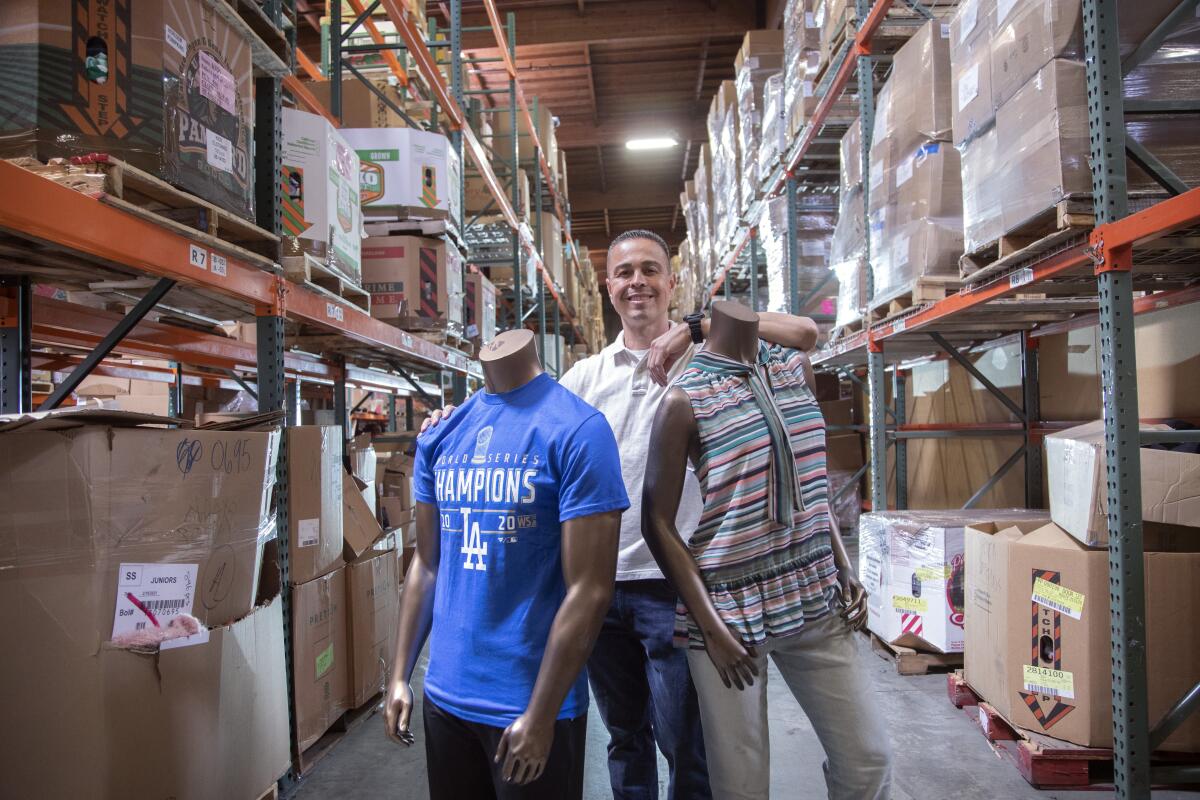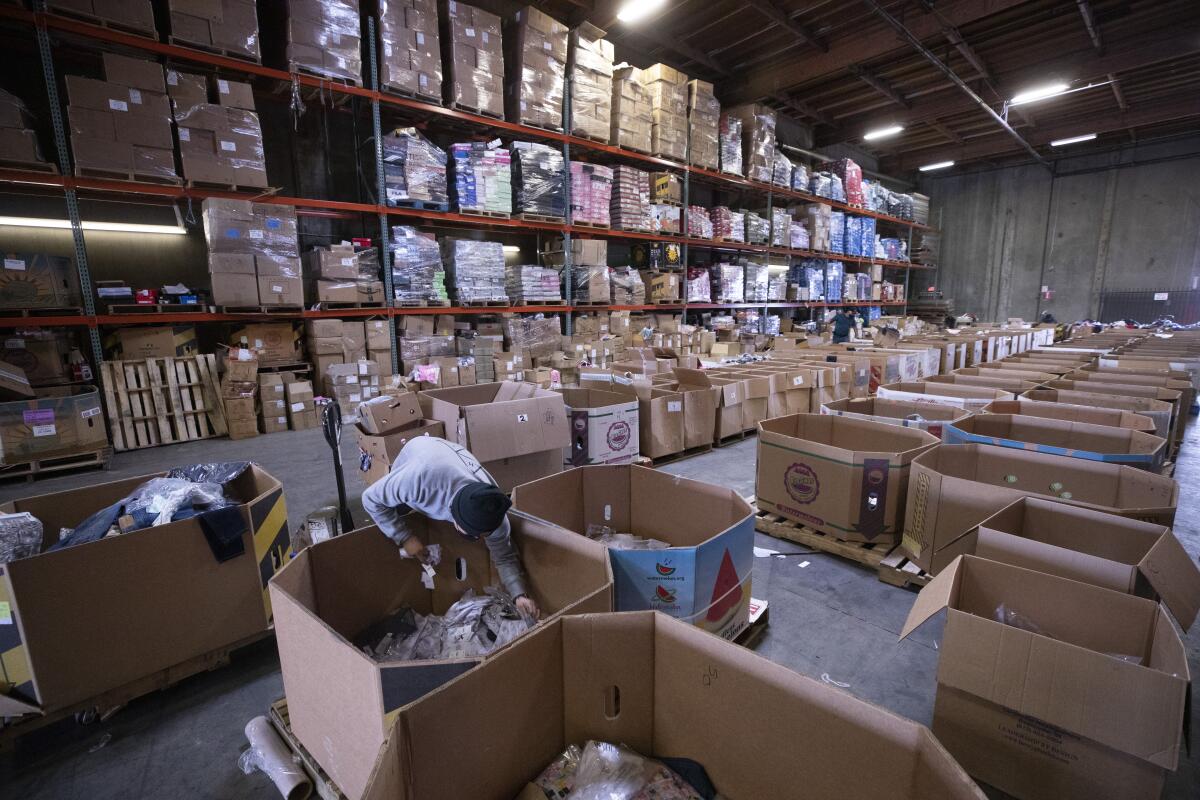Pandemic fueled a hot hustle: buying stuff cheap, reselling at a profit

It’s a hustle as old as humankind: Get something on the cheap; persuade someone to take it off your hands for more. After the pandemic shut people in and wiped out jobs, the gig got supercharged.
One couple has sold $12,400 of Walmart instant soup mix since June. Another reseller is peddling boxes of 200 slightly wrinkled dresses for $800.
These freshly minted entrepreneurs managed to bootstrap their own businesses with little or no funding, often starting by selling common consumer products online from their homes and then expanding to warehouses.
“We’ve seen crazy growth,” said Marcus Shen, chief operating officer of B-Stock Solutions, which bills itself as the world’s largest business-to-business online marketplace for the unsold, the surplus, the returned and the liquidated. The Belmont, Calif., company has experienced a 34% increase in new resellers in the last year, he said.
“We’ve seen a lot of new folks who are looking for that side hustle, the gig they can run on the side because they’re just sitting at home, or maybe underemployed,” Shen said. “They are experimenting with buying merchandise in bulk, and then creating reselling opportunities for their own e-commerce stores.”

These repeddlers aren’t the people using social networks and apps to clean out their closets and garages, which also became wildly popular during the shutdown.
They are dedicated product flippers with a vast internet audience, according to mobile marketplace OfferUp, primed by the pandemic to want items to make homes more comfortable and suitable for remote working and schooling.
EBay, B-Stock and other sites make it a lot easier to get started as a reseller than you might think.
Resellers have gotten some of the blame for big price increases of popular goods in the last year, causing crackdowns by Amazon and EBay. The New York Times famously found an Amazon reseller stuck with 17,700 bottles of hand sanitizer, acquired mainly by driving around and cleaning out retailer shelves in Tennessee and Kentucky.
At EBay, Chief Executive Jamie Iannone told investors and analysts that in addition to the fourth-quarter holiday surge, “we experienced unprecedented traffic levels for most of 2020.” The last three months of 2020 brought a 21% increase in the amount of merchandise sold (to $26.6 billion), a 5% rise in active sellers and a 7% increase in active buyers compared with the year-earlier quarter.
John Traches has experienced this boom in good and bad ways. Traches was forced to close his Santa Fe Springs business, JT Merchandise Outlet, when the coronavirus lockdown stopped sales cold.
“For about a good month and a half, there was nothing going on,” Traches said. But by the end of April 2020, Traches began to get a trickle of requests from prospective buyers, he said. Then it became a flood.
“It was incredible,” Traches said, with sales suddenly running 20% higher than before the pandemic, in 2019. “This industry just kind of took off ever since May of 2020.”
Using Facebook and newspaper ads, Traches has been selling pallets of athletic shoes for $1,000, boxes of 200 dresses for $800, collections of pots, pans and other kitchen equipment for $450.
A lot of Traches’ products are bought from B-Stock and sold mostly to other resellers in Mexico and Central and South America, he said. Traches also sells to locals, but he takes customers into the warehouse only by appointment because of coronavirus restrictions.
A sure sign of the increasing number of resellers vying for products is that merchandise has become scarce. Traches said he had been able to obtain a truckload of goods per week, but lately it’s been more like a truckload every three or four weeks.
“All of a sudden the prices went up almost $1 to $1.50 per unit,” Traches said, “and that is a much higher cost to us because we’re dealing in 1,000- and 2,000-piece lots and we are trying to buy several of them a week. I do know a lot of people who have started their own little business to sell online. There’s a lot more competition out there now.”
That new competition includes Juan and Katherine Castillo, owners of El Juidero Wholesale & Resale in Worcester, Mass.
The couple had been selling stainless-steel cookware door to door on commission. Then, as the pandemic raged and people hunkered down and stocked up as if for a hurricane, the Castillos hit the jackpot reselling instant soup mix from Walmart, ringing up $12,400 in revenue.
“We just kept buying and reselling, buying and then reselling,” said Juan Castillo, who is from the Dominican Republic, as is his wife, Katherine. The duo, who live in Worcester, soon branched out into shoes, apparel and other items, using family connections to develop customers on their home island and in Ghana. Sales run between $5,000 and $10,000 a month.
“We have many, many customers. We have Latinos, Africans,” Juan Castillo said. “They buy cheap from us, and they buy a lot.”
On their Facebook and Instagram pages, the Castillos recently were advertising in English and Spanish large quantities of clothing and handbags, which fill huge racks covering walls of the small warehouse they have relocated to.
The Castillos waited to quit their day jobs until the resale business, which they started in June, proved a clear winner.
Although all-purpose sales sites like Craigslist and EBay can be good, niche sites can often sell specific types of items faster and with less hassle.
All businesses involve risks, and reselling is no different.
There are licenses to be acquired if a seller is more than a casual dabbler or wants to buy from wholesalers, and research to be done into sourcing, demand and competition in various items, among other things. And taxes need to be collected and paid. Many resale sites offer get-started guides for newcomers.
Joshua Brown, 34, thought he was making a pretty good living working in procurement for an automotive manufacturer.
But the pandemic had affected his job, and Brown, a single father with three children, was constantly worried about money. To build up some savings, he created JB Liquidators, focusing on reselling home improvement supplies and equipment.
“I started just buying a pallet here and a pallet there, tools and things like that,” Brown said. “I just knew that if you can catch them when the prices are low, I could make some money reselling it.
“I knew people that would buy some of the things. I thought that would be interesting to start off with.”
Brown took on two partners, and revenue reached $90,000 in 2020. The pace picked up, and in the first three months of 2021, revenues hit $57,000, he said, primarily in Ohio, Indiana and Kentucky.
“We got a LLC written up. We made sure we did everything the right way,” Brown said. “Pretty early on, we were buying truckloads of stuff.”
On the company’s Google and Facebook pages, JB Liquidators was advertising a bathtub for $100, a $799 pellet smoker with a gas griddle for $350, a $375 Husky truck toolbox for $200. There was flooring with an MSRP of $1,314 that was being sold for $650, a laundry cabinet and faucet selling at a $99.99 discount, and much more.
“We had a lot of bumps and bruises along the way, learning what to acquire and when,” Brown said. “We had a learning curve, but I think we have done really well.”
So far, he’s also keeping his day job with Honda.
One question now is what will happen to the reselling entrepreneurs as more and more Americans receive COVID-19 vaccines, restrictions on gatherings and indoor activities are eased, and people become less hesitant to do in-person browsing inside a bricks-and-mortar store. Will reselling as a side gig peter out as the virus fades away?
Shen thinks the resale boom will lose a little bit of its steam but not all of it.
“I think that we certainly will see some normalization here,” Shen said, “and when people are no longer stuck in front of their phones and their laptops and with nothing better to do, I expect that we’ll start to see things taper off.
“But I don’t think that entrepreneurial spirit will stop. That’s not going back in the box.”
More to Read
Inside the business of entertainment
The Wide Shot brings you news, analysis and insights on everything from streaming wars to production — and what it all means for the future.
You may occasionally receive promotional content from the Los Angeles Times.













